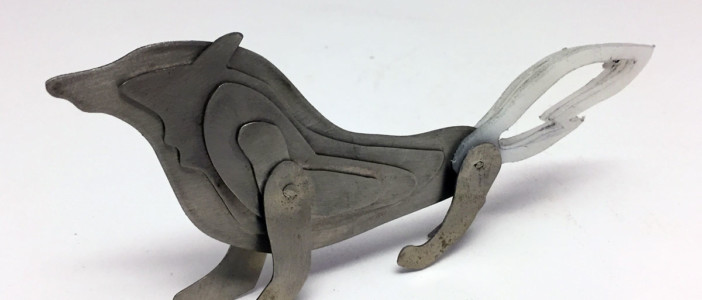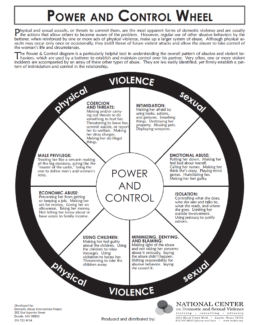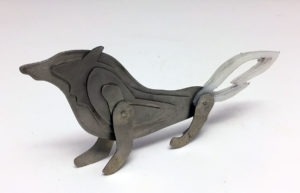
Young… Love?
By Madaline Hucks '20
PSYC-240: Psychology of Gender
In this reflection paper by Madaline Hucks on domestic abuse, she poignantly, authentically, and vividly describes how her own experiences in a past relationship map onto the “Power and Control Wheel” of abuse and the circular stages of domestic violence. Madaline’s paper showcases an accurate and all-too-real understanding of intimate partner abuse and she deftly weaves together course content, emotion, and raw personal experience into a powerful narrative that will stick with you long after you have read it.
– Randall Renstrom
Adolescence is a time when both boys and girls are discovering themselves and interacting with their peers in new ways. First kisses and hand-holding are hallmarks of this time, and one’s first “puppy love” may take over their hormonal and dramatic selves. But what happens when this lovesick admiration goes wrong? Domestic abuse is often thought of as a violent altercation between two adults, but it can take many different forms. This type of abuse between people in any sort of intimate relationship is characterized by a cycle of power and control. Sadly, domestic abuse is not limited to adults and can be seen in teenage relationships as well. At the tender age of 16, I entered into what would be my first long-term relationship. It was much darker than a typical first love is expected to be. Following the power and control wheel model (figure 1), this is my evaluation of my first experience with young… love?
The first point on the wheel is intimidation, which uses words and actions to make one feel fearful, in addition to destruction of property. For the sake of this paper, let’s call this boy Jason. Jason was much larger than my then-slender five feet and four inches, towering over me at six-foot-two with a muscular build. If I did anything that displeased him, he would look at me with daggers in his eyes. Glancing in another person’s direction in public or challenging anything he said in front of others required some degree of punishment in his eyes. Jason held my hand whenever possible to show ownership of me. Even if my actions were unintentional, anything I did that irritated him would earn an immediate, bone-crushingly intense squeeze to my slim fingers, forcefully intertwined with his. If I was caught driving somewhere I was not “supposed to,” or with people he did not approve of, he made threats of hiding my keys. One day, an argument in my parents’ garage ended in him taking my key fob and smashing it to pieces on the concrete floor. Needless to say, I did not drive anywhere for awhile.
The next piece of the wheel is emotional abuse, which includes putting one down, name calling, playing mind games, causing feelings of guilt and making one feel as if they are going “crazy.” Jason was very manipulative when it comes to this topic. My naturally dark locks were not well suited to him. He made me feel so bad that within a month of dating, I bleached my entire head blonde. In addition, he would often use names such as “slut” or “whore” in order to get me to act the way that he wanted. Jason was no stranger to mind games, and he played them well when it came to the way I dressed. Any tight piece of clothing such as skinny jeans, leggings, or a v-neck shirt was off limits. These articles, along with shoes or jewelry that he did not like, would be hidden. When I was getting ready for school in the morning, I would call him to ask him if he had seen a certain piece of my clothing and he convinced me that I lost it or that my cleaning lady was stealing from me. Often, my mom would find “lost” clothing items stuffed in a drawer in the basement or at the bottom of the big garbage can, with only him to blame for such actions. He also liked me to wear a shirt that matched his to “look like a cute couple,” even though we did not go to the same school and no one would see that we were matching. If not that, he told me that I had to wear his oversized, baggy sweatshirts to school so no one would “look at me and think I was pretty, so I could not cheat on him.” To ensure these rules were followed, he would call me every morning and ask what I had “chosen” to wear that day. He had broken my spirit to the point that I was afraid to lie to him, so I just submitted to his requirements.
He had broken my spirit to the point that I was afraid to lie to him, so I just submitted to his requirements.
The third part of the wheel that I want to discuss is isolation. Isolation entails controlling what one does and who one sees and talks to—all while using jealousy to justify the abuser’s actions. Jason liked being my only confidant and would do whatever it took to make sure I was not letting anyone else into my life. My few friends that I had were gone within a couple months of dating. He would send them horribly mean messages behind my back and threatened them so they would not tell me anything. I did not find this out until after the breakup. He also attempted to harm my relationship with my family, stating that they were not really looking out for me and the only person who could do so properly was himself. Taking it a step further, he decided to infiltrate my hobbies and the activities I was in at that time. Dance class and show choir were my passions, and he slowly began taking them away from me. He would ensure that I wore baggy clothes with his school name on them to practice to make sure “every guy there knew I was taken.” Every performance he would sit in the audience and criticize me afterwards if I “looked like I was having too much fun” with other people on stage. As our relationship progressed, Jason did not even have to be with me in order to control my actions. Every night he would call me, as he lived in the town over, and demand that he be the last person I talked to before I went to sleep. If I had talked to him for the night, there was no more talking with my family or being on my phone at all. Once that call from him had ended, my phone was to be shut off. I was so fearful of him by this point that I didn’t even put up a fight, I just did as he said to avoid the consequences.
The last portion of the wheel I will discuss is quite serious, involving coercion and threats. Falling into this category is making or carrying out threats and threatening to commit suicide if one tries to leave, among other things. As Jason went to another school and could not physically have his eyes on me 24 hours a day, seven days a week, he would tell me that I was being watched. He said that he had spies at my school watching me during the day to see if I ever slipped up and disobeyed the rules that he set for me. Being terrified of the repercussions, I submitted. The part-time job I had at a local grocery store was monitored as well. Oftentimes he would sit outside in my car and watch me through the big windows. If that was not enough, he would periodically come inside and walk around the store, all while keeping his eyes on me. I was not to smile at anyone, especially boys, because, to him, that was cheating. The one thing that scared me most was his suicide threats. I never wanted to be the reason someone was harmed, and he convinced me that if he killed himself, I would be blamed for it legally. Looking back now, this seems absolutely ridiculous. However, it was very real at the time. Every time he called I was to answer my phone, regardless of whether I was in class or not. One day, towards the end of our relationship, I let it go to voicemail. The threatening texts came to follow, along with 100 more phone calls from him. Jason, thinking that he was losing his grip on me, decided to send me a series of pictures with a haunting message. Pictures of him sitting in my bedroom with a very large gun were sent to my phone. He said if I did not call him in two minutes that he was going to kill himself and it would be all my fault. That is enough to get anyone to listen. To this day, this incident still horrifies me.
There are many factors that contribute to domestic abuse. Analyzing the situation now, many of these things were at play. Even though he was 16, Jason drank often, in addition to using a number of drugs which could impair thinking and judgment. I suspect social learning also played an integral role in his actions. Coming from a very dysfunctional home with non-married parents, who were substance users themselves, was his model. His own dad fathered 15 children with 13 different women and was very abusive to each party. Learning that example as a child most certainly contributed to his unhealthy dating beliefs. In addition, he was originally from a large city in which gangs are prominent. Coming from one of these gangs himself had exposed him to many ugly parts of the world and could have affected his perception of women and how to get—and remain—in control. Perhaps these unhealthy behaviors and negative attitudes were the only ways that he was taught to treat people in order to get his way. Arguably, the power and control aspect is a key part in maintaining this cyclical hell. Jason desperately wanted to have power over someone to make him feel superior, stronger, and more masculine. All these factors, combined with a wide-eyed, naive teenage girl, created the perfect storm for him.

Lizzy Budiselich, ceramic
The cycle of abuse was largely a part of what kept the relationship afloat for almost a year and a half. Phase one of the cycle is when tensions build in the relationship, in the form of the maladaptive behaviors discussed above. Phase two is when some type of violence occurred. In my situation it was often screaming and serious suicide threats. Phase three is what really perpetuated the abuse in my opinion. This is the time in which the abuser tries to make up for their actions by apologizing, promising it will never happen again, and begging for forgiveness. It was during these periods that I thought that he would change, and we could really be together forever. He would buy me flowers after every fight we had to try to make up. On the outside, Jason looked like a dutiful boyfriend who spoils his girlfriend. If only others knew that for every bouquet I received, I had been rung out like a towel the day before.
This cycle of abuse, along with the attributes of the power and control wheel, contributed to the absolute torture that was my first relationship. Intimidation, emotional abuse, isolation, coercion, and threats should never rear its ugly head in any sort of relationship. When my innocent heart went looking for puppy love, I thought I had found it—only for it to take off its mask to reveal something much more grim. Looking back on this time in my life I knew that he had treated me despicably, but never considered it to be “bad enough” to be domestic abuse. Analyzing the power and control wheel revealed the relationship to be just that–abusive. Long after we have parted ways, these experiences still influence my attitudes towards dating. A broken mind and spirit takes time to heal from abuse, and, contrary to what he thought, cannot be patched up with a dozen roses, like a bandaid over a cut.

